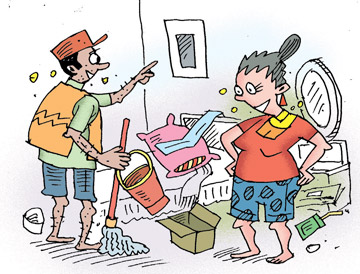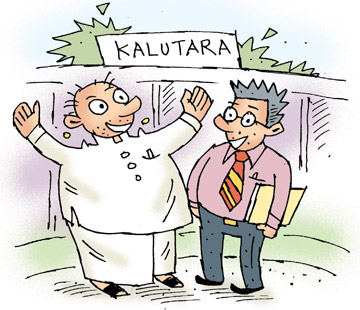|

by R. S. Karunaratne
The future passive voice
We use the future passive voice like the future active voice to say
things that we think, guess or know about the future or to ask questions
about the future.
|

Your room will be cleaned while you are out. |
In the future all manual work will be done by machines.
Where will the meeting be held tomorrow?
You will be woken at 5 a.m.
Will I be woken at 6 a.m.?
Will you be woken at 4 a.m.?
The new hospital building will be opened by the health minister.
Will English be spoken everywhere in the world in 2050?
The job will be finished in a few days.
Your room will be cleaned while you are out.
Your passport will be sent to you by post.
We can make future passive negatives and questions.
The debate will not be held as arranged.
The debate won’t be held as arranged. (Contraction)
The visitors won’t be accommodated in this hotel.
The new hospital won’t be built in the Kalutara district.
English won’t be spoken at the conference to be held in Paris.
[Activity]
Make future passive sentences using the following words. Check your
answers with the key. Use punctuation marks where necessary.
1. next year / your house / demolish / local authority
.............................................
|

The new hospital won’t be built in the Kalutara district. |
2. tomorrow / your car / service / mechanic
.............................................
3. next week / dinner / cook / new chef
..............................................
4. tonight / dinner / serve / at the / workplace
..............................................
5. one day / glass / use to build / houses
..............................................
6. In 20 years / no paper / use / in offices
..............................................
7. in 100 years / cars / drive / using wind power
...............................................
8. The keys / of the / house / hand over / to you / next week
...............................................
9. tomorrow / votes / count / at 10 centres
...............................................
10.prices/ of consumer items / reduce / before / the election
................................................
Key:
1. Next year your house will be demolished by the local authority.
2. Tomorrow your car will be serviced by the mechanic.
3. Next week dinner will be cooked by a new chef.
4. Tonight dinner will be served at the workplace.
5. One day glass will be used to build houses.
6. In 20 years no paper will be used in offices.
7. In 100 years cars will be driven using wind power.
8. The keys of the house will be handed over to you next week.
9. Tomorrow the votes will be counted at 10 centres.
10.Prices of consumer items will be reduced before the election.
Match words and meanings
Here’s an interesting way to enrich your vocabulary. Match the words
in column ‘A’ with the meanings in column ‘B’ and check your answers
with the key. The first one has been done for you.
[Column A]
M 1. brocade
.... 2. brochure
.... 3. broiler
.... 4. broken-hearted
.... 5. bronchitis
.... 6. bronze
.... 7. brooch
.... 8. brood
.... 9. brooding
.... 10. brook
.... 11. broom
.... 12. broomstick
.... 13. broth
.... 14. brouhaha
.... 15. brownish
.... 16. browse
.... 17. bruise
.... 18. brunch
.... 19. brunette
.... 20. brutal
.... 21. brutalise
.... 22. brute
.... 23. bubbly
.... 24. bucolic
.... 25.budding
[Column B]
A. a thin soup
B. a broom made of sticks
C. a brush with a long handle
D. a small stream
E. feeling sad
F. a group of young birds born at the same time
G. a small piece of jewellery with a pin at the back
H. a brown metal made of copper and tin
I. an illness in which the bronchial tubes become infected
J. extremely unhappy
K. a young chicken suitable for roasting
L. a type of small magazine
M. heavy cloth with a raised design
N. beginning to develop
O. relating to the countryside
P. full of energy and enthusiasm
Q. a rough and violent man
R. to treat somebody in a cruel way
S. cruel
T. a white woman with dark hair
U. a combination of breakfast and lunch V. an injury where the skin has
not been broken
W. to look through a book without reading everything
X. slightly brown
Y. a lot of noise
Key:
2. L 3. K 4. J 5. I 6. H 7. G 8. F 9. E 10. D 11. C 12. B 13. A 14. Y
15. X 16. W 17. V 18. U 19. T 20. S 21. R 22. Q 23. P 24. O 25.N
Starters:
Question tags
A question tag is a short question added on to a statement. Where a
tag is spoken, the voice can go up and down.
It's a lovely morning, isn't it?
We're having a difficult time, aren't we?
You haven't heard of him, have you?
He is very tall, isn't he?
Some girls are very shy, aren't they?
|

The prince is very handsome,isn't he? |
We add a negative tag to a positive statement.
He is a great scientist, isn't he?
These workers are very loyal, aren't they?
The prince is very handsome, isn't he?
The boy writes well, doesn't he?
Amanda received a letter, didn't she?
We add a positive tag to a negative statement.
It isn't very cold here, is it?
Watson hasn't got a mansion, has he?
You shouldn't cry, should you?
You aren't rich, are you?
Your answer isn't right, is it?
We use only pronouns in the tag.
Wordsworth was a great poet, wasn't he?
Eve isn't a nurse, is she?
Brian was an inspector, was he?
The principal punished the errant student, did he?
Rex is an artist, isn't he?
For the simple present tense and the simple past tense, we use a form
of ‘do’ in the tag.
You live near here, don't you?
This book looks nice, doesn't it?
You forgot to bring my book, didn't you?
We don't have to come tomorrow, do we?
The flush doesn't work, does it?
Requests and suggestions
After a request with an imperative, we use ‘Can you' or ‘Could you?’
Wait here a moment, can you?
Give me an apple, could you?
You couldn't help him, could you?
You haven't done your homework, have you?
After ‘don't’ we use the tag ‘will you?’
Don't write anything on the walls, will you?
Don't make a noise, will you?
Don't smoke here, will you?
Don't play in the classroom, will you?
Don't swim in the sea, will you?
After ‘let's’ we use the tag ‘shall we?’
Let's learn English, shall we?
Let's join the literary society, shall we?
Let's tell the truth, shall we?
Let's obey the road rules, shall we?
Let's protect the environment, shall we?
[Activity]
Give a suitable tag to each of the following sentences and check your
answers with the key.
1. You are in charge of this office, ...........?
2. Cats like to drink milk, ...............?
3. David doesn't do any work, ..............?
4. The situation doesn't bother you, .............?
5. We were listening to him, .................?
6. You need wristwatch, ...............?
7.You are quite happy, ...............?
8.We can sit on the grass, ...............?
9.These buns look fresh, ..............?
10.You're Shelley's friend, ..............?
Key:
1.aren't you 2. don't they 3. does he 4. does it 5. weren't we 6.
don't you 7. aren't you 8. can't we 9. don't they 10. aren't you
Quiz on idioms
An idiom is a group of words in a fixed order that have a particular
meaning that is different from the meaning of each word understood on
its own. Tick the meaning you think is correct and check your answers
with the key.
1. If you do something to clear the air ...
(a) you deal openly with problems
(b) you open the doors and windows
(c) you criticise everybody
2. If some change is in the air ...
(a) people are aware of it
(b) people are unaware of it
(c) nobody knows it
3. If somebody vanishes into thin air ...
(a) they can be traced
(b) they fly away
(c) they disappear completely
4. If something appears out of thin air ...
(a) it does not appear
(b) it appears suddenly
(c) it appears and disappears
5. If a decision is up in the air ...
(a) it has not been decided
(b) it has been decided
(c) it is impossible to take a decision
6. If you are floating on air ...
(a) you feel very unhappy
(b) you feel very happy
(c) you feel bored
7. If you put on airs and graces ...
(a) you think you are more important than others
(b) you think you are less important than others
(c) you think you are an honest person
8. If people are rolling in the aisles ...
(a) they are laughing uncontrollably
(b) they are dancing
(c) they are sleeping
9. If you think you are a smart alec ...
(a) you think you are timid
(b) you think you are very honest
(c) you think you are very clever
10. If somebody is alive and kicking ...
(a) they are humorous
(b) they are still active and existing
(c) they are dead
Key:
1.(a) 2. (a) 3. (c) 4. (b) 5. (a) 6. (b) 7. (a) 8. (a) 9. (c) 10. (b) |

